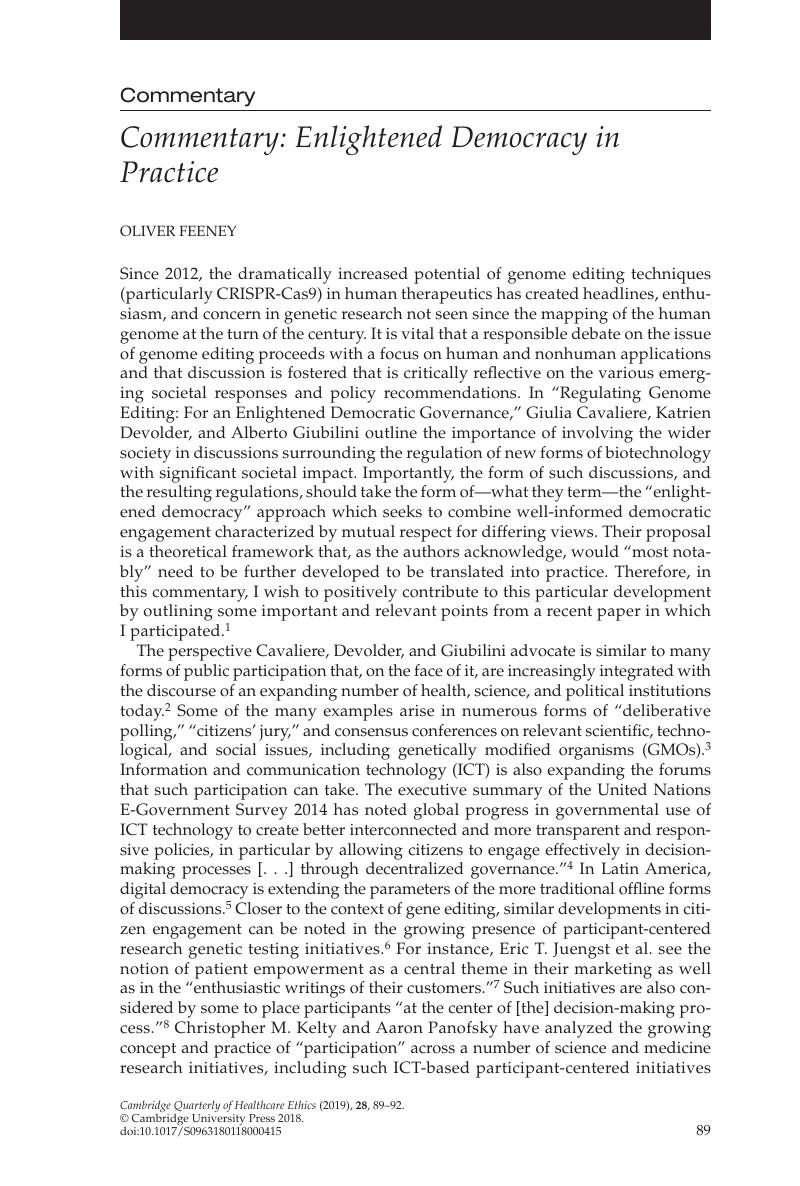No CrossRef data available.
Published online by Cambridge University Press: 20 December 2018

1. Feeney, O, Borry, P, Felzmann, H, Galvagni, L, Haukkala, H, Nordal, S, et al. Genuine participation in participant-centred research initiatives: The rhetoric and the potential reality. Journal of Community Genetics 2018;9(2):133–42.CrossRefGoogle ScholarPubMed
2. Kelty, C, Panofsky, A. Disentangling public participation in science and biomedicine. Genome Medicine 2014;6(8):1–14;CrossRefGoogle ScholarPubMed Wyatt, S, Bier, J, Harris, A, van Heur, B. Participatory knowledge production 2.0: Critical views and experiences. Information, Communication and Society 2013;16(2):153–9.CrossRefGoogle Scholar
3. Fishkin, JS, Luskin, RC. Experimenting with a democratic ideal: Deliberative polling and public opinion. Acta Politica 2005;40(3):284–98;CrossRefGoogle Scholar Fishkin, JS. Consulting the public through deliberative polling. Journal of Policy Analysis and Management 2003;22(1):128–33;CrossRefGoogle Scholar Gooberman-Hill, R, Horwood, J, Calnan, M. Citizens’ juries in planning research priorities: Process, engagement and outcome. Health Expectations 2008;11(3):272–81;CrossRefGoogle ScholarPubMed Fish RD, Winter M, Oliver DM, Chadwick DR, Hodgson CJ, Heathwaite AL. Employing the citizens’ jury technique to elicit reasoned public judgments about environmental risk: Insights from an inquiry into the governance of microbial water pollution. Journal of Environmental Planning and Management 2014;52(2):233–53; Paul C, Nicholls R, Priest P, McGee R. Making policy decisions about population screening for breast cancer: The role of citizens’ deliberation. Health Policy 2008;85(3):314–20; Huitema D, Cornelisse C, Ottow B. Is the jury still out? Toward greater insight in policy learning in participatory decision processes: The case of Dutch citizens’ juries on water management in the Rhine Basin. Ecology and Society 2010;15(16), available at http://www.ecologyandsociety.org/vol15/iss1/art16/ (last accessed 16 Sept 2018); Braunack-Mayer AJ, Street JM, Rogers WA, Givney R, Moss JR, Hiller JE. Including the public in pandemic planning: A deliberative approach. BMC Public Health 2010;10(1), available at https://bmcpublichealth.biomedcentral.com/articles/10.1186/1471-2458-10-501 (last accessed 16 Sept 2018); Bennett P, Smith SJ. Genetics, insurance and participation: How a citizens’ jury reached its verdict. Social Science and Medicine 2007;64:2487–98; Anderson C, Stackhouse R, Shaw A, Iredale R. The National DNA Database on trial engaging young people in South Wales with genetics. Public Understanding of Science 2011;20(2):146–62; Burgess M. From trust us to participatory governance: Deliberative publics and science policy. Public Understanding of Science 2014;23(1):48–52; O’Doherty KC, Burgess MM, Edwards K, Gallagher RP, Hawkins AK, Kaye J, et al. From consent to institutions: Designing adaptive governance for genomic biobanks. Social Science and Medicine 2011;73(3):367–74; O’Doherty KC, Hawkins AK, Burgess MM. Involving citizens in the ethics of biobank research: Informing institutional policy through structured public deliberation. Social Science and Medicine 2012;75(9):1604–11; Secko DM, Preto N, Niemeyer S, Burgess MM. Informed consent in biobank research: A deliberative approach to the debate. Social Science and Medicine 2009;68(4):781–9; Dry SM, Garrett SB, Koenig BA, Brown AF, Burgess MM, Hult JR, et al. Community recommendations on biobank governance: Results from a deliberative community engagement in California. PLoS ONE 2017;12(2):e0172582; Olson JE, Ryu E, Johnson KJ, Koenig BA, Maschke KJ, Morrisette JA, et al. The Mayo Clinic Biobank: A building block for individualized medicine. Mayo Clinic Proceedings 2013;88:952–62; McElfish, PA, Narcisse, MR, Long, CR, Ayers, BL, Hawley, NL, Aitaoto, N, et al. Leveraging community-based participatory research capacity to recruit Pacific Islanders into a genetics study. Journal of Community Genetics 2017;8(4):283–91.CrossRefGoogle ScholarPubMed
4. Sonntagbauer, P, Nazemi, K, Sonntagbauer, S, Prister, G, Burkhardt, D. Handbook of Research on Advanced ICT Integration for Governance and Policy Modeling. Hershey, PA: IGI Global; 2014.CrossRefGoogle Scholar
5. Sampaio RC, Rousiley CMM, Marques FPJA. Participation and deliberation on the Internet: A case study of digital participatory budgeting in Belo Horizonte. Journal of Community Informatics 2011;7(1–2); Serdült U, Welp Y. How sustainable is democratic innovation? Tracking neighbourhood councils in Montevideo. Journal of Politics in Latin America 2015;7(2):131–48; Mendonça RF. Assessing some measures of online deliberation. Brazilian Political Science Review 2015;9(3):88–115.
6. Vayena, E, Tasioulas, J. Adapting standards: Ethical oversight of participant-led health research. PLoS Medicine 2013;10(3), available at https://journals.plos.org/plosmedicine/article?id=10.1371/journal.pmed.1001402 (last accessed 16 Sept 2016);CrossRefGoogle ScholarPubMed Kaye, J, Curren, L, Anderson, N, Edwards, K, Fullerton, SM, Kanellopoulou, N, et al. From patients to partners: Participant-centric initiatives in biomedical research. Nature Reviews Genetics 2012;13(5):371–6.CrossRefGoogle ScholarPubMed
7. Juengst, ET, Flatt, MA, Settersten, RA Jr. Personalized genomic medicine and the rhetoric of empowerment. Hastings Centre Report. 2012;42(5):34–40.CrossRefGoogle ScholarPubMed
8. See note 5, Kaye et al. 2012:371.
9. See note 2, Kelty, Panofsky 2014.
10. Burgess, M, O’Doherty, K, Secko, D. Biobanking in British Columbia: Discussions of the future of personalized medicine through deliberative public engagement. Personalised Medicine 2008;5(3):285–96:285.CrossRefGoogle ScholarPubMed
11. Serdült, U, Welp, Y. How sustainable is democratic innovation? Tracking neighbourhood councils in Montevideo. Journal of Politics in Latin America 2015;7(2):131–48.Google Scholar
12. See note 1, Feeney et al. 2018.
13. Woolley, JP, McGowan, M, Harriet, JAT, Coathup, V, Fishman, JR, Settersten, RA Jr, et al. Citizen science or scientific citizenship? Disentangling the uses of public engagement rhetoric in national research initiatives. BMC Medical Ethics 2016;17(1):33.CrossRefGoogle ScholarPubMed
14. See note 13, Woolley et al. 2016.
15. Lafont, C. Deliberation, participation, and democratic legitimacy: Should deliberative mini-publics shape public policy. Journal of Political Philosophy 2015;23(1):40–63.CrossRefGoogle Scholar
16. Blacksher, E. Participatory and deliberative practices in health: Meanings, distinctions, and implications for health equity. Journal of Public Deliberation 2013;9(1):article 6, available at http://www.publicdeliberation.net/jpd/vol9/iss1/art6 (last accessed 16 Sept 2018).Google Scholar